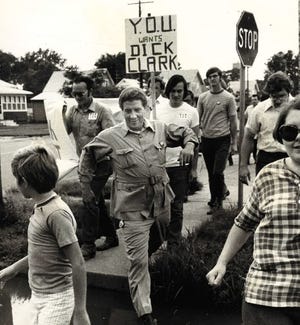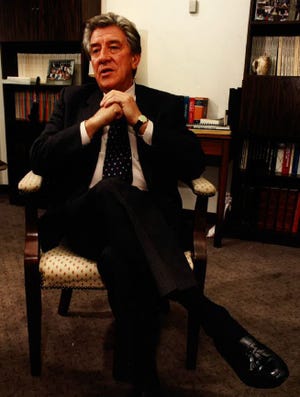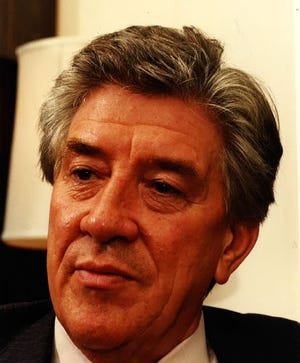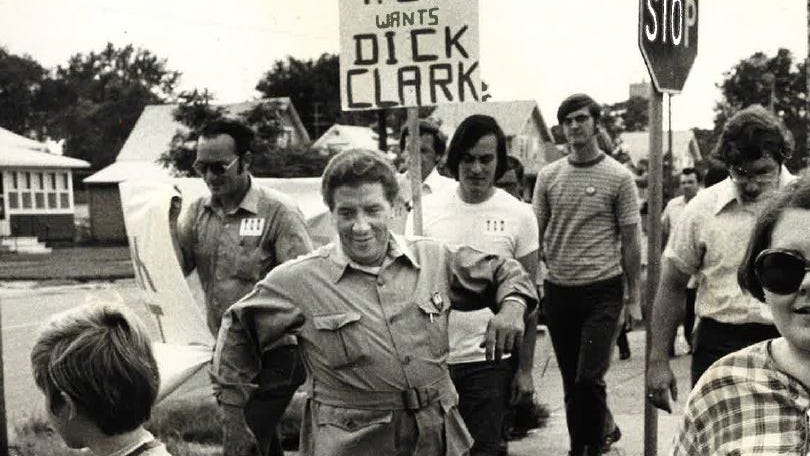Dick Clark, a Democrat who represented Iowa in the U.S. Senate from 1973 to 1979, died Wednesday at his home in Washington, D.C. He was 95.
He died peacefully in his sleep, his family said.
Clark defeated two-term Republican incumbent Sen. Jack Miller in a 1972 campaign where he walked across Iowa on foot, greeting Iowans one on one. His win came in a year when Republicans Richard Nixon and Robert Ray won Iowa's votes for the presidency and for governor.
Bill Roach, a former staffer for Clark during Clark's campaign and term in the Senate, said "there was a fundamental kindness about him."
"And I think doing that walk across the state really allowed that kindness to show in a media environment and in a political environment that we don’t have today," Roach said.
Roach said they never expected the walk to catch on the way it did.

"We were in this position where we had no money and no name recognition, and the guy we were running against, Jack Miller, had won all 99 counties in his previous reelection," Roach said. "So we just knew we had to do something that was a little outside the box."
The route took Clark largely along Highway 30, with some digressions, Roach said. Iowans would travel from around the state to join Clark to walk alongside him for a mile or two. Roach called it "kind of magical."
"Today it would feel like a gimmick," he said. "At that time, it did not."
Clark won the election with 55.1% of the vote to Miller's 44.1%. Independent candidate William Rocap received about 1%.
His work on the Foreign Relations Committee included chairing a subcommittee overseeing Africa, where he advocated for the end of apartheid in South Africa.

Clark led delegations of his fellow members of Congress on trips to Africa, including to South Africa, where he met with Black leaders who opposed apartheid.
South Africa's information secretary, Eschel Rhoodie, later claimed the country's apartheid government illegally spent $250,000 to defeat Clark in his reelection race.
Clark also authored the "Clark Amendment," which prevented the U.S. government from covertly funding anti-communist guerrilla groups in Angola. The amendment was repealed in 1985.
He lost his 1978 race for reelection to Republican U.S. Sen. Roger Jepsen.
"He was a great senator," Harkin said. "Very hardworking, very studious and well-liked. He was just well-liked by everyone."
From 1965 to 1972, Clark worked as an administrative assistant to then-U.S. Rep. John Culver, who passed on running for Senate in 1972 but went on to win Iowa's other Senate seat in 1974, two years after Clark.

"It was always kind of a tongue-in-cheek joke that Dick Clark was now the senior senator and his former boss was the junior senator from Iowa," Harkin said.
Following his Senate term, President Jimmy Carter appointed Clark ambassador at large and U.S. coordinator for refugee affairs in 1979.
In 1980, Clark worked for U.S. Sen. Edward Kennedy's unsuccessful challenge to Carter for the Democratic presidential nomination.
Clark then became a senior fellow and director of the congressional program at the Aspen Institute, where he organized seminars to educate members of Congress on policy issues.
Harkin said he attended several overseas trips organized by Clark while he was in the Senate, where he said lawmakers got to meet with foreign officials and learn about other countries, as well as forge friendships with members of the opposite party that helped them work together on legislation.
"It was an excellent service that he provided to both Republicans and Democrats," Harkin said.
Richard Clarence Clark was born in the unincorporated community of Paris, Iowa, in Linn County, on Sept. 14, 1928. He graduated from Lamont High School in 1947.
He served in the U.S. Army from 1950 to 1952 and was stationed in Europe, later saying "the Army was the best thing that ever happened to me," according to an obituary provided by his family.
Clark graduated from Upper Iowa University in 1953 and went on to earn a master's degree and a Ph.D. from the University of Iowa in 1959. He then taught history and political science for five years at Upper Iowa University before working for Culver and entering politics full time.
He is survived by his wife, Julie Kennett Clark, three children, three grandchildren and two great-grandsons.

He died peacefully in his sleep, his family said.
Clark defeated two-term Republican incumbent Sen. Jack Miller in a 1972 campaign where he walked across Iowa on foot, greeting Iowans one on one. His win came in a year when Republicans Richard Nixon and Robert Ray won Iowa's votes for the presidency and for governor.
Bill Roach, a former staffer for Clark during Clark's campaign and term in the Senate, said "there was a fundamental kindness about him."
"And I think doing that walk across the state really allowed that kindness to show in a media environment and in a political environment that we don’t have today," Roach said.
Roach said they never expected the walk to catch on the way it did.

"We were in this position where we had no money and no name recognition, and the guy we were running against, Jack Miller, had won all 99 counties in his previous reelection," Roach said. "So we just knew we had to do something that was a little outside the box."
The route took Clark largely along Highway 30, with some digressions, Roach said. Iowans would travel from around the state to join Clark to walk alongside him for a mile or two. Roach called it "kind of magical."
"Today it would feel like a gimmick," he said. "At that time, it did not."
Clark won the election with 55.1% of the vote to Miller's 44.1%. Independent candidate William Rocap received about 1%.
Clark used Senate subcommittee chairmanship to oppose apartheid in South Africa
Clark served on the Agriculture, Public Works and Foreign Relations committees during his time in the Senate.His work on the Foreign Relations Committee included chairing a subcommittee overseeing Africa, where he advocated for the end of apartheid in South Africa.

Clark led delegations of his fellow members of Congress on trips to Africa, including to South Africa, where he met with Black leaders who opposed apartheid.
South Africa's information secretary, Eschel Rhoodie, later claimed the country's apartheid government illegally spent $250,000 to defeat Clark in his reelection race.
Clark also authored the "Clark Amendment," which prevented the U.S. government from covertly funding anti-communist guerrilla groups in Angola. The amendment was repealed in 1985.
He lost his 1978 race for reelection to Republican U.S. Sen. Roger Jepsen.
A 'low-key, earnest, hardworking Iowan'
Former U.S. Sen. Tom Harkin, a Democrat who won election to Congress in 1974 and succeeded Jepsen in the Senate, remembered Clark as a "low-key, earnest, hardworking Iowan.""He was a great senator," Harkin said. "Very hardworking, very studious and well-liked. He was just well-liked by everyone."
From 1965 to 1972, Clark worked as an administrative assistant to then-U.S. Rep. John Culver, who passed on running for Senate in 1972 but went on to win Iowa's other Senate seat in 1974, two years after Clark.

"It was always kind of a tongue-in-cheek joke that Dick Clark was now the senior senator and his former boss was the junior senator from Iowa," Harkin said.
Following his Senate term, President Jimmy Carter appointed Clark ambassador at large and U.S. coordinator for refugee affairs in 1979.
In 1980, Clark worked for U.S. Sen. Edward Kennedy's unsuccessful challenge to Carter for the Democratic presidential nomination.
Clark then became a senior fellow and director of the congressional program at the Aspen Institute, where he organized seminars to educate members of Congress on policy issues.
Harkin said he attended several overseas trips organized by Clark while he was in the Senate, where he said lawmakers got to meet with foreign officials and learn about other countries, as well as forge friendships with members of the opposite party that helped them work together on legislation.
"It was an excellent service that he provided to both Republicans and Democrats," Harkin said.
Richard Clarence Clark was born in the unincorporated community of Paris, Iowa, in Linn County, on Sept. 14, 1928. He graduated from Lamont High School in 1947.
He served in the U.S. Army from 1950 to 1952 and was stationed in Europe, later saying "the Army was the best thing that ever happened to me," according to an obituary provided by his family.
Clark graduated from Upper Iowa University in 1953 and went on to earn a master's degree and a Ph.D. from the University of Iowa in 1959. He then taught history and political science for five years at Upper Iowa University before working for Culver and entering politics full time.
He is survived by his wife, Julie Kennett Clark, three children, three grandchildren and two great-grandsons.

Dick Clark, a Democrat who won a US Senate seat by walking across Iowa, dies at 95
Dick Clark, a Democrat who represented Iowa in the US Senate from 1973 to 1979, died Wednesday at his home in Washington, D.C. He was 95.
www.press-citizen.com